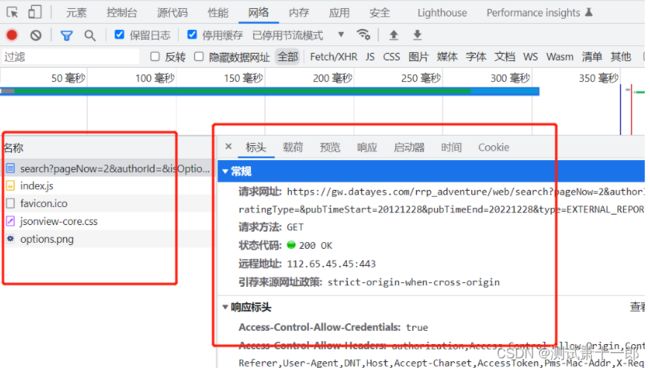selenium 获取请求响应信息,包括请求的响应头和响应体
在我们使用selenium请求网页时,有时不想从浏览器解析后的html标签获取数据,如果能直接获取url返回的json格式数据会更容易解析。就像request和scrapy爬虫返回的响应数据一样。那么,我们用selenium应该怎么做呢?
selenium并不支持获取响应的数据,我们可以使用selenium-wire库,selenium-wire扩展了 Selenium 的 Python 绑定,可以访问浏览器发出的底层请求。 编写的代码与 Selenium 的方式相同。
- 安装selenium-wire库:
pip install selenium-wire- 修改引入方式
# from selenium import webdriver
from seleniumwire import webdriver
- 获取网络响应的内容,也就是如图部分的url响应:
driver.requests
- 解析返回的响应头
driver.requests返回的是一个列表,遍历每个url来获取想要的url响应信息。一下示例演示如果获取指定url的请求头,获取到的请求头可以直接使用request发送请求。
# 提取接口的请求信息
get_conver_header = {}
get_conver_url = ""
for request in driver.requests:
if "https://coXXX.com/api/" in request.url:
get_conver_url = request.url
for header_key in request.headers:
get_conver_header[header_key] = request.headers[header_key]
break- 获取返回响应体
from io import BytesIO
import gzip
# 清空之前获取的请求信息
del driver.requests
# 获取响应体的内容数据
rp_body = driver.requests[0].response.body
# 获取到的编码为byte数据,需要解码为utf-8,直接解码会报错
# UnicodeDecodeError: 'utf-8' codec can't decode byte 0x8b in position 1: invalid start byte
# print输出的字节码是以"b’\x1f\x8b\x08"开头的,说明它是gzip压缩过的数据,所以我们要对字节码进行一个解码操作
buff = BytesIO(rp_body)
f = gzip.GzipFile(fileobj=buff)
htmls = f.read().decode('utf-8')
print(htmls)